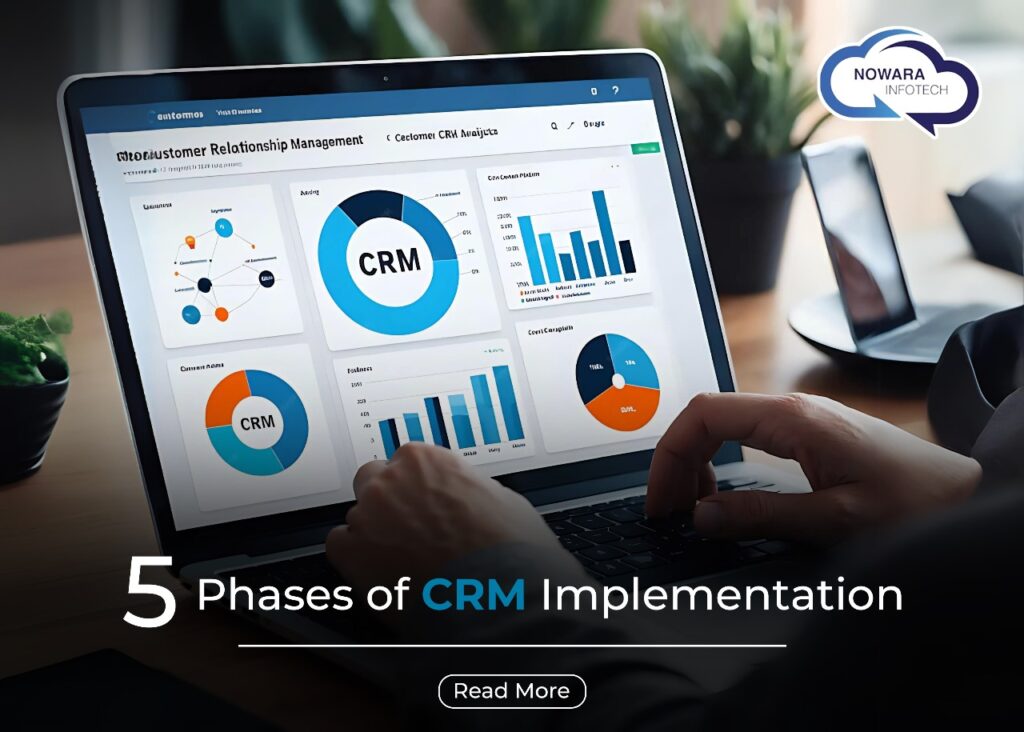In today’s competitive business landscape, successful CRM implementation is key to fostering stronger customer relationships, boosting sales, and streamlining operations. A well-executed CRM system empowers businesses to enhance their customer interactions and drive growth. But how can you ensure a smooth and efficient CRM implementation?
At Nowara Infotech, a leader in CRM implementation services in India, we’ve outlined five essential phases to make your CRM deployment a success. Let’s dive into the step-by-step process that ensures your business maximizes its CRM investment.
Plan a CRM Strategy
Before diving into any CRM system, you must establish a comprehensive CRM strategy that aligns with your business goals. This planning phase lays the groundwork for how the CRM will be used to meet specific objectives.
- Define Business Objectives: What are your key business goals? How can CRM help improve sales, customer service, and operational efficiency?
- Set KPIs: Develop clear KPIs, such as improving customer retention rates or boosting lead conversions, to measure the success of your CRM.
- Map the Customer Journey: Understand how your CRM can support each stage of the customer lifecycle—from lead generation to customer loyalty.
- Why Planning Matters: A well-defined strategy ensures the system aligns with your needs, enabling your CRM to deliver value over the long term. This is crucial given that 91% of businesses with more than 11 employees use a CRM, and businesses using CRM are 86% more likely to meet their sales goals.
Select the Right CRM
Not all CRM systems are created equal. Choosing the right CRM software is critical to ensuring that it meets the needs of your business.
- Consider Features: Look for systems that offer powerful contact management, sales automation, and reporting tools.
- Integration Capabilities: Your CRM should integrate seamlessly with existing platforms like email, social media, and marketing automation tools.
- Customization: Ensure the system can be tailored to your business processes, with flexible workflows and reporting dashboards.
- Success Stat: With the right CRM in place, businesses see an average increase of 21-30% in sales revenue, as a properly integrated CRM streamlines both internal and external processes.
Data Migration
Data migration is a crucial step during CRM implementation. It involves transferring your existing customer data into the new CRM system, which must be done carefully to ensure data accuracy.
- Clean Your Data: Ensure your data is free from errors, duplicates, and inconsistencies before migrating.
- Map the Data: Ensure that all fields in the old system correctly map to the new CRM system’s structure.
- Test the Migration: Conduct several rounds of testing to ensure that data transfers seamlessly and without loss.
- Why It’s Important: Poor data migration can lead to issues later, but when done right, businesses can benefit from shorter sales cycles by 8-14 days, thanks to better-organized customer information.
Training and Change Management
After your CRM is implemented, it’s essential to train your team and manage any changes the system brings to their daily workflows.
- Hands-On Training: Offer detailed training sessions that are role-specific to ensure employees understand how to leverage the CRM effectively.
- Manage Change: Communicate the benefits of the CRM to encourage team members to adopt the new system enthusiastically.
- Provide Ongoing Education: Regularly update your staff with new features, improvements, and tips to keep their skills sharp.
- Impact on Productivity: Teams using a CRM save an average of 5-10 hours per week, as automation and streamlined workflows take repetitive tasks off their plates. Employee satisfaction also rises, with CRM users reporting a 17% increase in job satisfaction.
Implementation and Testing
The final phase is bringing your CRM to life. This stage is where you fully implement the CRM system, ensuring that it works as intended before rolling it out to your entire team.
- Test the System: Conduct rigorous testing to verify that automations, integrations, and workflows are functioning correctly.
- User Feedback: Let team members test the CRM in real-world scenarios and provide feedback.
- Improve Session: Make adjustments based on user feedback before full deployment to ensure maximum efficiency.
- Proof of ROI: With thorough testing and feedback, businesses achieve an average ROI of $30.48 for every dollar spent on CRM, underscoring the system’s potential to drive success.
Key Considerations for CRM Implementation and Support
To ensure long-term success, consider these additional factors when implementing your CRM system:
Mobile CRM Application: With 70% of businesses using mobile CRMs, it’s crucial to opt for cloud-based systems that allow teams to access data from anywhere.
Ongoing Support: Post-implementation, many businesses require expert support to ensure their CRM continues to meet their evolving needs. At Nowara Infotech, we provide comprehensive CRM implementation and support services to help businesses get the most from their CRM systems.
Why Nowara Infotech?
CRM implementation for businesses isn’t just about selecting a tool. It’s about strategic planning, seamless execution, and ongoing optimization. Nowara Infotech, a trusted name in CRM implementation services in India, offers end-to-end CRM solutions to help businesses streamline operations, drive growth, and boost customer satisfaction.
Ready to revolutionize your business? Contact Nowara Infotech today for expert CRM implementation and support. Let’s turn your customer relationships into long-term business success!

